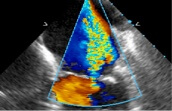Valvular heart disease describes an abnormality of one of the heart valves. Valve disease is usually due to ‘wear and tear’ but an abnormally formed valve can also cause it. Valves can become narrowed (stenotic) and / or leaking (regurgitant). The valve abnormality is classified as mild, moderate or severe. Small leaks on some valves are considered a normal finding.

How common is it?
Valvular heart disease becomes increasingly common with increasing age, affecting approximately 1 in 40 of the population. Mild valve disease is seen in half of the population by the age of 80.
What symptoms might I get?
If the valve abnormality is mild or moderate then symptoms are uncommon. Severe valve disorders do not always cause symptoms but, if they do, then breathlessness, palpitation, ankle swelling are commonly reported.
Will I need treatment?
It depends on the type and severity of the valve abnormality. Most patients with mild valve abnormalities do not require treatment for example, only about 10% of patients with mitral valve prolapse will require surgery. If the valve is severely abnormal and is either causing symptoms or changes to the way the heart functions then surgery may be necessary. Drug therapy to lower blood pressure can help the heart function and potentially delay the need for surgery.
What extra tests are required?
There are a number of different tests that may be required depending on the severity of the valve abnormality. Most patients will require a series of heart ultrasound scans (echocardiogram) to monitor the condition. Other tests that may be necessary include an exercise tolerance test, ambulatory ECG monitor and a cardiac MRI.
Is it hereditary?
Usually not but bicuspid aortic valves can be inherited.
Does this affect my life expectancy?
If you have a severe valve abnormality that is causing symptoms then left untreated it can reduce your life expectancy.
What happens next?
If you have been diagnosed with valvular heart disease then, depending on the severity, you can be recommended to see your GP or a local cardiologist.
Useful links
http://en.wikipedia.org/wiki/Valvular_heart_disease